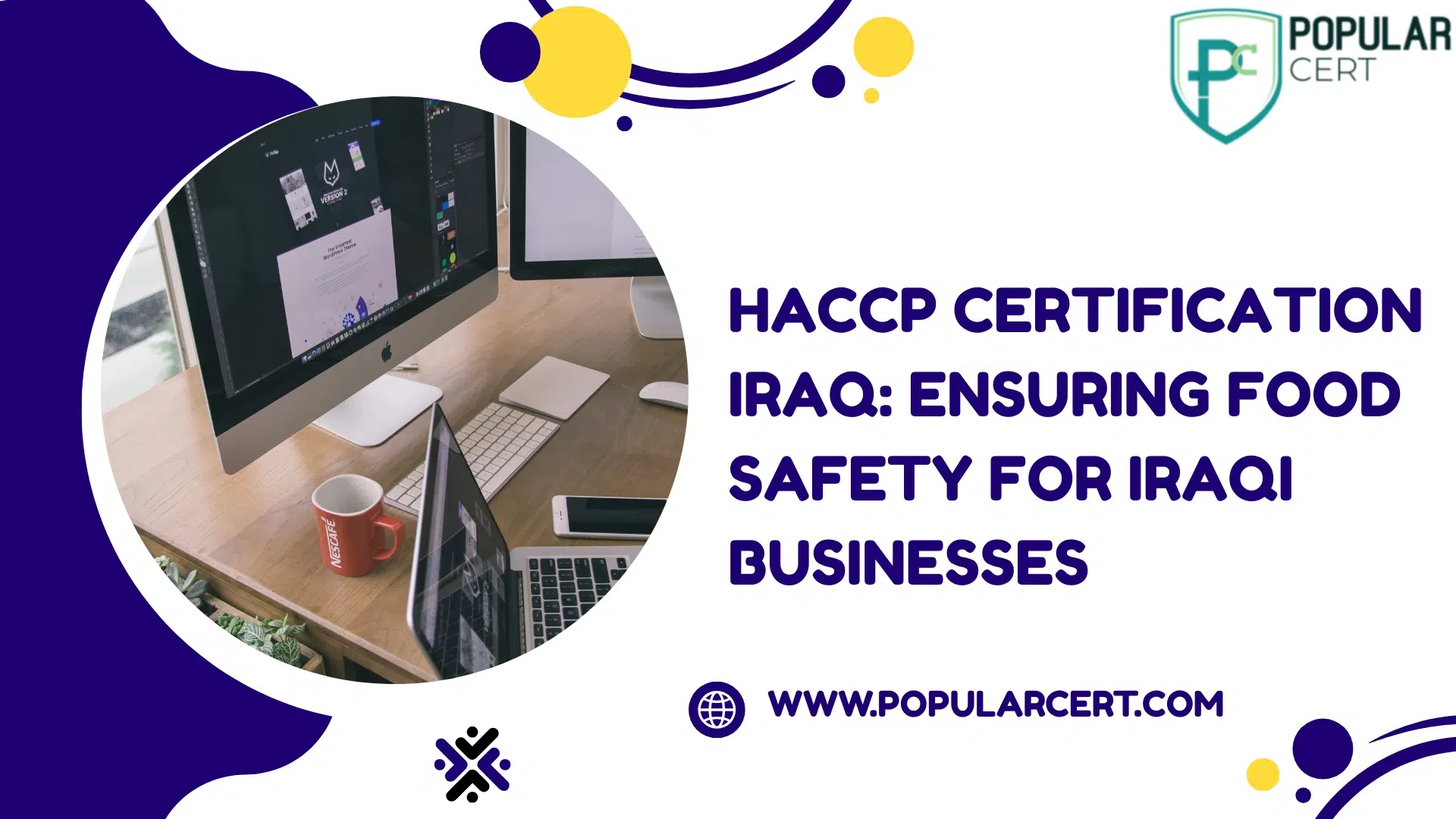HACCP Certification for Iraqi Food Industry: Ensuring Safety and Compliance

Introduction – When a Single Contamination Sparks a Crisis
Consider a food processing business based in Baghdad. It prepares exported and locally sold packaged snacks. One day, food handlers become careless, leading to a batch of processed food becoming contaminated. This leads to consumer complaints, lost profit, costly product recalls, and reputational damage to the business. It will take a long time to fix the issues and to bridge the damage suffered.
The problems and issues I have in mind will only become more frequent and worse in the coming years with the increased volume of packaged and processed foods. This could lead to problems with food safety and international standard compliance. This is the primary focus of HACCP certification in Iraq. Analysis and Critical Control Points is a standard and systematic process of ensuring food safety. With operational HACCP, the risk of zero food contamination and consumer safety becomes a reality, compliance with Iraqi food standards and HACCP international food standards.
Why HACCP is a Game-Changer for Iraqi Food Businesses
Viewing HACCP merely as a compliance requirement is incorrect, it is also a business strategy. Achieving value is easier as proactive mitigation of hazards is avoided.
HACCP provides value to Iraqi food businesses in a number of ways:
- Increased trust: Safety is ensured in the products that consumers buy.
- Compliance: Alignment with food safety standards both locally in Iraq as well as globally.
- HACCP allows for the opening of previously unattainable markets for export.
Take for example the mid-market juice maker in Basra. Lack of HACCP certification resulted in customer dissatisfaction and export rejections, but this changed with the certification. Risk of contamination was significantly minimized and product export approval refined.
Real Benefits: How HACCP Turns Safety into Profit
The benefits of HACCP go beyond just safety. They lead to real business growth:
- Safer products & consumer trust: Less complaints and a stronger reputation.
- Regulatory compliance: Inspections become easier and license renewals are less of a hassle.
- Export potential: New market opportunities in Europe and the Gulf as you meet safety standards.
- Risk reduction: Less chances of recalls and potential lawsuits.
As an example, a bakery in Erbil incorporated the HACCP system and estimated a 30% decrease in production mistakes and enhanced orders delivery. New safety agreements also helped the bakery to secure contracts with regional supermarket chains.
How Iraqi Food Companies Can Achieve HACCP Certification
Although it may appear complex, HACCP certification is guaranteed with a systematic approach. For example:
- Hazard Analysis: Examine potential biological, chemical, and physical process hazards.
- Critical Control Points (CCPs): Identify points in the process where controls must be applied to prevent or eliminate a hazard.
- Monitoring Procedures: Consistent checks ensure controls are maintained.
- Corrective Actions: Identify its systems that allow a process to deviate from the standards or rules and assign actions.
- Records: Documentation will support your claims of compliance.
- Certification Audit: A body like PopularCert will assign you recognition based on the compliant evaluation and recognition of your processes.
Advice: Keep your staff trained, have documented checklists, and make compliance reviews every so often to keep compliance.
Overcoming Implementation Challenges – Lessons from the Field
Common barriers for food businesses in Iraq include.
- Under trained staff: The personnel do not have the proper understanding of the HACCP principles to successfully manage the audits.
- Incomplete documentation: Audit failures due to the records not being adequate.
- Reluctance to modify: Older processes can be difficult to modify.
- Realistic approach: For the HACCP principles, train often and keep it simple with the SOPs for the processes. Prioritize the major hazards for the business first.
Small dairy producer in Najaf for example. Gaining HACCP certification in 6 month with proper guidance to documentation, adopting training principles,
PopularCert Success Stories – Guiding Iraqi Companies to Excellence
Types Of Certification
- ISO Certification
- ISO 9001 Certification
- ISO 14001 Certification
- ISO 45001 Certification
- ISO 22000 Certification
- ISO 27001 Certification
- ISO 17025 Certification
- ISO 13485 Certification
- ISO 20000-1 Certification
- ISO 22301 Certification
- ISO 50001 Certification
- ISO 37001 Certification
- IATF 16949 Certification
- ISO 29001 Certification
- ISO 31000 Certification
- ISO 20121 Certification
- ISO 10002 Certification
- ISO 41001 Certification
Get Free Consultation
Our Clients


















PopularCert gives comprehensive support for HACCP certification in Iraq.
- Audits: Identify any gaps and areas for improvement.
- Documentation: Prepare templates and provide instructions concerning documentation for compliance records.
- Training: Conduct team workshops for effective HACCP implementation.
An example would be PopularCert’s assistance to snack producers in Erbil who could not meet the export demand. PopularCert helped the clients in performing hazard analysis, CCP identification, and taught the employees. Improved product quality and HACCP certification success helped the clients gain new customers abroad in just 4 months after training.
Conclusion – Building a Safer, Compliant, and Profitable Future
For Iraqi food companies, food safety is not simply a legal requirement. It is, in fact, a business advantage. HACCP Certification Iraq focuses on ensuring products are safe, compliant, and competitive for the local and international markets.
PopularCert helps Iraqi businesses complete certification in a hassle-free manner. Businesses within Iraq have proper expert insights, trained support staff, and guided training. Today will ensure safety for consumers, and tomorrow will boost the profitability and growth of the business.
GET A FREE CONSULTATION NOW
FAQs
Is HACCP certification mandatory in Iraq?
While not mandatory for all food businesses, it is highly recommended, especially for those exporting products.
How long does the certification process take?
Typically 4–6 months, depending on company size and complexity.
Which types of food businesses require HACCP?
Producers, processors, packagers, and exporters of all food types.
Does HACCP improve export potential?
Yes, many international buyers require HACCP-certified suppliers.
How often is certification renewed?
Certification is usually valid for 3 years with periodic audits.
